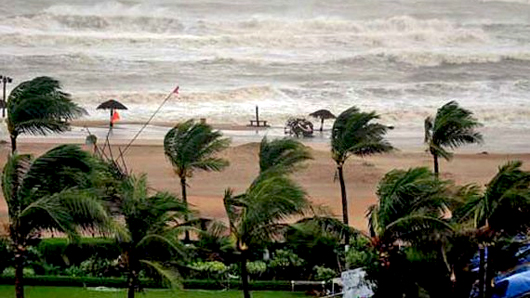
New Delhi, Oct 11: Cyclone Hudhud is fast approaching the Odisha and North Andhra Pradesh coast. It is likely to make landfall at Visakhapatnam on Sunday afternoon.
Odisha government has asked the Center to send satellite phones for rescue and relief work. Home Minister Rajnath Singh has also spoken to the chief ministers of Andhra Pradesh, Telangana and Odisha, and discussed the plan to combat cyclone Hudhud.
Cyclonic storm Hudhud over East Central Bay of Bengal moved westnorth westward and lay centred over West Central Bay and adjoining East Central Bay at 17.30 hours at about 675 km east-southwest of Visakhapatnam, a weather office report said.
NDRF DIG SS Guleria said, "we have sent 15 teams in Andhra Pradesh. Each team has 45 officers. We have also sent boats to deal with flood situation. Evacuation will start from tomoorw morning. Evacuation of animals will also be done."
"As per the current assessment, the cyclone will cross Visakhapatnam by October 12. It is likely to cross the east coast between Visakhapatnam and Gopalpur in the afternoon of the 12th," LS Rathore, Director General of the IMD, said.
He also said that the wind speed of Hudhud was much lower in comparison to the devastating Cyclone Phailin that hit the Odisha coast in October 2013, but the two cyclonic storms belonged to the same category.
"If we compare this system to Cyclone Phailin, then we can say that the wind speed is much lower. Cyclone Phailin had speeds going up to 200kph, but the category of both the systems are same," Rathore said.
The National Disaster Response Force (NDRF) has said its preparations are on war-footing to deal with any emergency.
"We have deployed battalions in Odisha and Andhra Pradesh. We have sent teams to Visakhapatnam on Thursday morning," OP Singh, the Director General of the NDRF, said.
"We have also kept our forces in West Bengal on alert. We will also be activating our control rooms in the areas which are likely to be affected," he said.
The official said that the priority was to set up communications, which is often the first casualty of any natural disaster.





Comments
Add new comment